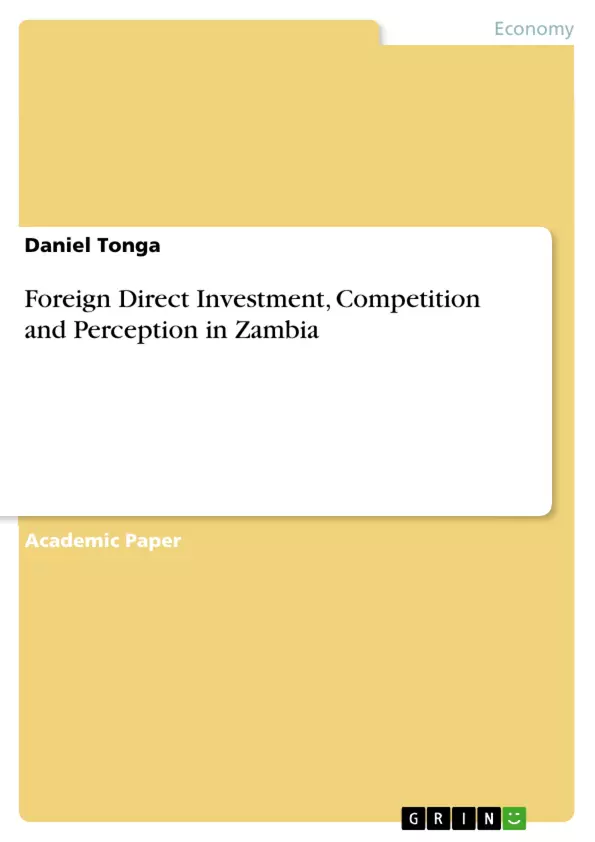This paper analyses the effects of Foreign Direct Investment (FDI) in Zambia. It focuses on two main areas of FDI: First, it looks at the competition effect of Foreign Direct Investment FDI to domestic businesses in the host country, Zambia and the second part looks at how residents perceive Foreign Direct Investment FDI in Zambia. In order to understand the competition effect of FDI in Zambia, the research study carried a survey on local business houses to get an understanding of how FDI with respect to foreign businesses has created competition to local businesses to their detriment.
In addition, the research study conducted interviews with various people in Zambia to collect data and get their perception on FDI with respect to foreign businesses in Zambia. This research found that people's perceptions over FDI are more negative than positive.
This research study also found that Foreign Direct Investment FDI has both positives and negatives externalities in Zambia. Under positive externalities, FDI has helped create employment to local people, facilitated the transfer of technology and innovation as FDI spillovers.
However, under negative externalities, this research found that FDI had brought more competition to local businesses in the host country, throwing many out of business. In addition, some businesses found it difficult to compete due to unfairness created by state interventions. Therefore, FDI in Zambia was found to have more negatives than positives externalities.
Table of Contents
- Introduction
- Objectives
- Statement of the Problem
- Methodology
- Data Sources
- Survey Approach
- Deductive Approach
- Analysis
- Findings
- Conclusion
- Recommendations
- References
Objectives and Key Themes
This research study aims to analyze the effects of Foreign Direct Investment (FDI) in Zambia. It focuses on the impact of FDI on competition within the domestic business landscape and the public perception of FDI in Zambia. The study aims to assess the benefits and drawbacks of FDI, taking into account both positive and negative externalities.
- The impact of FDI on competition in Zambia
- Public perception of FDI in Zambia
- Positive externalities of FDI, such as employment creation and technology transfer
- Negative externalities of FDI, such as increased competition for local businesses
- The role of foreign governments in supporting businesses from their own countries
Chapter Summaries
The introduction provides background on FDI in Zambia, highlighting its growth and the major investor nations. It discusses the types of FDI, including private investment, government-supported projects, and investment in specific sectors like mining and construction. The chapter also discusses the positive impact of FDI on Zambia's GDP and job creation. The introduction then provides an overview of the research objectives, outlining the study's focus on the competition effect of FDI and its perception among the Zambian public. The methodology chapter details the research approach, which includes both quantitative and qualitative methods. It describes the use of surveys and interviews, as well as the deductive approach used to analyze data. The data sources chapter provides a detailed description of the survey and interview methods employed in the study. It outlines the sample size, the types of respondents (local business owners and Zambian residents), and the specific questions asked.
Keywords
The research focuses on the impact of Foreign Direct Investment (FDI) in Zambia, exploring its influence on competition, public perception, and economic growth. The study examines the interplay between FDI, Gross Domestic Product (GDP), and the positive and negative externalities associated with foreign investment. Key themes include competition between local and foreign businesses, technology transfer, and the role of government support for foreign companies. The research also examines the implications of FDI for local businesses and the potential challenges they face.
Frequently Asked Questions
What is the focus of the research on FDI in Zambia?
The research analyzes the effects of Foreign Direct Investment (FDI) on domestic competition and public perception within Zambia.
What are the positive externalities of FDI mentioned in the study?
FDI has helped create employment for local people and facilitated technology transfer and innovation through "spillovers."
What negative impacts did the research find regarding local businesses?
FDI brought intense competition that pushed many local businesses out of the market, often due to unfair advantages or state interventions supporting foreign firms.
How do Zambian residents generally perceive Foreign Direct Investment?
The study found that people's perceptions of FDI are more negative than positive, largely due to its impact on domestic business survival.
Which sectors in Zambia are primarily targeted by FDI?
The abstract mentions significant investments in mining and construction, which are key drivers of Zambia's GDP.
What methodology was used to collect data for this study?
The research employed a mixed-methods approach, including surveys of local business houses and interviews with various residents in Zambia.
- Quote paper
- Daniel Tonga (Author), 2019, Foreign Direct Investment, Competition and Perception in Zambia, Munich, GRIN Verlag, https://www.grin.com/document/494789



